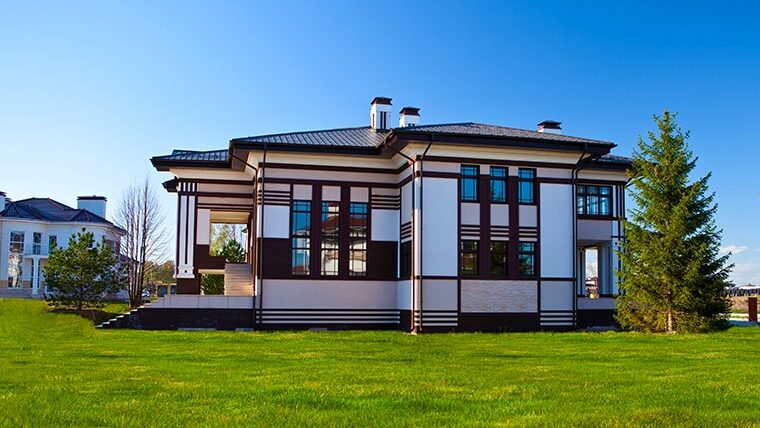

In 2025, the question of what is more profitable - renting an apartment or buying a home - is becoming more and more relevant. With changes in the economic situation, fluctuating real estate prices and rising interest rates, many people are considering how best to manage their finances. In this article, we look at the key aspects that will help you make an informed choice based on current data and forecasts.
A brief overview of the issue:
- The economic situation in the real estate market in 2025.
- Advantages and disadvantages of renting a home.
- Advantages and disadvantages of buying a condo.
- Financial analysis: renting vs buying.
- Personal and social factors influencing choice.
- Expert advice on how to make a decision.
Let's understand how each of these aspects can affect your decision and what nuances you should consider in order not to make a mistake in your strategy.
Economic situation in the real estate market in 2025
In 2025, the real estate market continues to be in the spotlight. The economic backdrop in which we live is changing, and this directly affects the supply and demand for housing. Below is some useful information, structured in a table and graph.
General economic background
The country's economy shows mixed signals: on the one hand, there is GDP growth and improvement in the labor market, but on the other hand, inflation continues to put pressure on the financial resources of citizens. Many experts note that in conditions of instability people begin to think about how to preserve their savings, and real estate is traditionally considered as a reliable asset.

Forecasts of house price growth
According to analysts, in some regions the growth of housing prices may reach up to 10-15% per year. This is due to the increase in demand for housing, especially in large cities, where there is an active development of infrastructure and creation of new jobs.
Impact of inflation and interest rates on the market
Inflation and interest rates are two key factors that affect the real estate market. In 2025, it is predicted that mortgage interest rates may rise, making home loans more expensive. This could reduce demand for apartments, as not everyone will be able to afford the high monthly payments.
Below is a table that illustrates key economic indicators and projections for 2025.
| Indicator | Value for 2025 | Notes |
|---|---|---|
| GDP growth | 2.5% | Moderate economic growth, stabilization in the labor market |
| Inflation rate | 6.5% | Impact on the purchasing power of citizens |
| Housing price growth forecast | 10-15% | Especially in the big cities |
| Mortgage interest rate forecast | 8-10% | Possible increase, which will affect demand |
| Average rent | 35,000 - 50,000 rubles | Depending on the region and housing condition |
Advantages and disadvantages of renting an apartment
Renting an apartment has its pros and cons, and it's important to consider them in detail before making a decision. Here are the main points to consider.
Advantages of renting
Flexibility
- Renting gives you the opportunity to change your residence as needed. If your work or studies require you to move, you can easily move to another neighborhood or city without worrying about selling the property.
- Example: My friend Anna often changes apartments depending on her needs. She may move closer to work or to a more comfortable neighborhood.
No long-term liabilities
- You are not tied to one place for a long period of time. This is especially important for young people and people who frequently change their place of work or study.
- You can easily change your living arrangements if you need to.
Low initial costs
- Renting usually only requires a deposit and the first month's rent, which is much less than a down payment when buying a home.
- This makes it quicker and easier to access housing, especially for young people and students.
Lack of responsibility for maintenance
- Most maintenance issues such as plumbing repairs or electrical problems are the responsibility of the landlord. This frees you from additional financial costs and worries.
Ability to test the neighborhood
- Renting allows you to try living in different neighborhoods and assess whether a place is right for you long term before deciding to buy.
Disadvantages of renting
Lack of property
- Paying your landlord does not create equity. All the money you spend on rent goes nowhere and you end up with no asset.
- This can be especially frustrating if rents increase over time.
Possible changes in lease terms
- The landlord may raise the rent or decide to sell the apartment, causing you additional inconvenience. You may need to look for a new place to live right away.
- This can cause stress and uncertainty in your life.
The need to comply with the landlord's rules
- In most cases, the landlord has rules and restrictions that you must abide by. For example, you may not be allowed to make repairs or keep pets.
- This limits your freedom to utilize the space.
Rising rental rates
- With inflation and changing economic conditions, rents may increase. This can put your finances at risk.
- Landlords can raise rents to compensate for their losses.
Market unpredictability
- The rental market can be unpredictable. With economic instability, you may not be able to find a place to live at a reasonable price or in the right neighborhood.

Impact of inflation and house price growth on rental rates
- Inflation and rising house prices can have a significant impact on rental rates. With rising housing prices, landlords tend to increase rental rates to maintain their profits.
- This means that even if you can afford the rent now, in a year's time you will have to reevaluate your budget, which can lead to financial hardship.
With the pros and cons of renting in mind, it's important to think about your long-term plans and finances. If you're looking for flexibility and aren't ready for a long-term commitment, renting may be a good solution. However, if you're looking to build equity and provide yourself with stability, it may be worth considering buying a home.
Advantages and disadvantages of buying a home
Buying a home is a serious step that requires careful analysis and a balanced approach. Let's consider the main advantages and disadvantages of this option.
Advantages of buying a home
Creation of equity capital
- When you buy a condo, you are investing in an asset that can increase in value over time. For example, if you bought a condo for $100,000 and after a few years its value increased to $130,000, not only did you get your investment back, but you also made a $30,000 profit. This allows you to use those funds for further investments or home improvements.
Complete freedom in space management
- As an owner, you can make any changes to your apartment, from layout to design. This gives you the opportunity to create a space that suits your preferences. For example, you can remodel to create an open kitchen-living room or choose the finishes to suit your taste.
Long-term investments
- Real estate has traditionally been considered a secure asset that can generate income over time. If you decide to rent out your apartment, it can be an additional source of income. For example, if you bought a condo for $100,000 and rent it out for $1,000 per month, that gives you $12,000 per year, which is 12% of your investment.
Stability and security
- Unlike renting, where the landlord may raise the rent or decide to sell the apartment, buying gives you the security of knowing you have your own place to live. This is especially important for families with children who need a stable environment in which to raise them.
The disadvantages of buying a home
High initial cost
- The down payment on a condo can be 20-30% of its value. For example, if you are buying a condo for $100,000, you will need to put down $20,000 to $30,000 at once. For many people, this can be a major barrier to purchase.
Responsibility for maintenance and repairs
- When you buy an apartment, all the costs of maintaining it fall on you. This includes not only regular utility costs, but also unexpected repair costs. For example, if your apartment's heating or roof breaks, you will have to spend several thousand dollars to repair them. I remember when my sister faced a similar situation: it cost her $1,500 to repair the roof, which hit her budget hard.
Risks associated with fluctuations in interest rates
- In 2025, experts predict mortgage interest rates will rise. This could make mortgages more expensive and increase your monthly payments. For example, if your mortgage rate increases from 8% to 9%, your monthly payments could increase by several hundred dollars, which could significantly impact your budget.
The need for long-term planning
- Buying a home is a long-term commitment. If you plan to move to another city or country, you may find it difficult to sell or rent out your home. It requires extra effort and expense.
So, when choosing between renting and buying a home in 2025, it's important to consider the pros and cons of each option. Your personal circumstances and finances can play a crucial role in this choice. If you are ready for a financial commitment and want to create a stable place to live, buying a home can be a great decision. However, if you're looking for flexibility and a smaller financial burden, renting may be a better option.
Financial analysis: renting vs buying
Now let's move on to a more detailed financial analysis that will help you understand what is more profitable: renting or buying a home. This is an important step that requires a careful approach and consideration of all possible costs.
Comparison of monthly rental and purchase costs
When analyzing the financial costs, you should take into account that renting an apartment involves regular payments that may increase over time. Let's look at the approximate costs of renting and buying a home.
| Parameter | Renting an apartment | Buying an apartment |
|---|---|---|
| Cost of the apartment | $67,000 | $67,000 |
| Monthly rent | $400 | N/A |
| Monthly mortgage payments | N/A | $560 |
| Annual costs | $4,800 | $6,720 |
| Projected rent growth | 10% after one year. | N/A |
| Potential increase in the value of the apartment after 10 years | N/A | $87,000 |

Analysis of long-term financial implications
The long-term financial implications also matter. For example, if you rent an apartment for 10 years, you will spend about $48,000 on rent alone. Whereas, if you buy an apartment, even including mortgage interest, you will build equity that will grow with real estate prices.
| Parameter | Lease (10 years) | Purchase (10 years old) |
|---|---|---|
| Total costs over 10 years | $48,000 | ~$80,000 |
| Potential value of the apartment in 10 years | N/A | $87,000 |
| Net income (sales less costs) | N/A | ~$7,000 |
Personal and social factors
When choosing between renting and buying a home, it's important to consider not only the financial aspects, but also personal circumstances that may influence your decision.
How personal circumstances influence the choice between renting and buying
- Age and career: If you are young, just starting your career and unsure of your future plans, renting may be a smarter option. It will give you the opportunity to adapt to changes and not be tied to one place. For example, many young professionals prefer to rent in major cities so that they can easily change jobs.
- Stability of operation: On the other hand, if you have a stable job and plan to start a family, buying a home can be a great solution. It will allow you to create a cozy space to live in and provide for your family. For example, many couples expecting children choose to buy an apartment or house to ensure safety and comfort for future generations.
Impact of social stability and employment opportunities
- economic situation: You should not forget about the social situation around you. For example, if your city has high unemployment or an unstable economy, this may affect your decisions. In such circumstances, renting can provide more flexibility and protection from risk. You will be able to change your residence quickly if there are difficulties with your job.
- Infrastructure and opportunities: It is also important to consider the quality of life in the area. The presence of good schools, medical facilities and recreational facilities may influence your decision. For example, families with children are more likely to choose neighborhoods with high-quality educational facilities, which may incline them to buy a home in such areas.

The role of marital status and future plans
- Family status: Marital status also plays a significant role. If you are planning to have children or already have a family, buying a home may be a higher priority. This will provide stability and comfort for your loved ones. For example, if you have children, it is important to have enough space for them to grow and develop.
- Future plans: It is also important to consider personal plans. If you plan to move to another city or country in the coming years, renting may be a better option. However, if you are sure you will stay in one place, buying may be a wise investment.
So, when deciding whether to rent or buy, it is important to consider not only the financial aspects, but also your personal circumstances and future plans. A balanced decision will allow you to choose the most suitable option that suits your needs and goals.
Conclusion
In 2025, the choice between renting and buying a home remains a relevant and multifaceted issue. Each option has its advantages and disadvantages, and it is important to consider both financial aspects and personal circumstances.
Ultimately, the decision whether to rent or buy should be based on your individual financial situation, life plans and preferences. If you have any doubts or questions, feel free to contact a professional financial advisor or realtor who can help you evaluate all of your options and make an informed choice.
Buying real estate can be a lucrative investment, especially with rising home prices, but you need to consider the risks and future projections.
Changes in interest rates directly affect the cost of a mortgage, making the purchase more or less affordable. It is important to take into account the forecasts and the current rate dynamics.
It is important to consider financial capacity, future plans, income stability, and the current state and outlook of the real estate market.
Buying a home allows you to create ownership and potentially benefit from rising prices, but requires significant upfront costs and maintenance responsibilities.
Leases provide flexibility and less financial commitment, but do not create ownership. Rental rates can rise, especially in an inflationary environment.
Economic conditions, including inflation and interest rates, have a significant impact on both rental rates and mortgage costs, which can affect the decision to buy or rent.
Should you consider buying a home as an investment in 2024?
Buying real estate can be a lucrative investment, especially with rising home prices, but you need to consider the risks and future projections.
How do interest rate changes in 2024 affect your home buying decision?
Changes in interest rates directly affect the cost of a mortgage, making the purchase more or less affordable. It is important to take into account the forecasts and the current rate dynamics.
What factors should I consider when choosing between renting and buying?
It is important to consider financial capacity, future plans, income stability, and the current state and outlook of the real estate market.
What are the pros and cons of buying real estate in 2024?
Buying a home allows you to create ownership and potentially benefit from rising prices, but requires significant upfront costs and maintenance responsibilities.
What are the advantages and disadvantages of renting in 2024?
Leases provide flexibility and less financial commitment, but do not create ownership. Rental rates can rise, especially in an inflationary environment.
How does the economic situation in 2024 affect renting and buying a home?
Economic conditions, including inflation and interest rates, have a significant impact on both rental rates and mortgage costs, which can affect the decision to buy or rent.




























